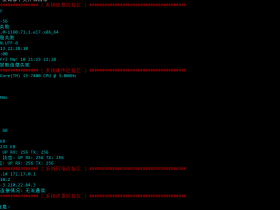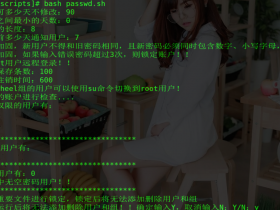ubuntu18.04安装mysql多实例
基于公司业务,mysql资源资源利用率不高,然后本着节约资源的出发点,在服务器上装了mysql多版本。还有一点,开发这边没把项目使用的mysql版本向上做兼容。
1.服务器规划
| 服务器ip |
主机名 |
角色 |
mysql端口 |
主从 |
| 172.40.12.11 |
devopstack01 |
mysql5.5.62/5.7.26 |
3306/3308 |
mysql5.5主,mysql5.7从 |
| 172.40.12.12 |
devopstack02 |
mysql5.5.62/5.7.26 |
3306/3308 |
mysql5.7主,mysql5.5从 |
2. mysql下载地址
wget https://dev.mysql.com/get/Downloads/MySQL-5.7/mysql-5.7.26-linux-glibc2.12-x86_64.tar.gz
wget https://downloads.mysql.com/archives/get/p/23/file/mysql-5.5.27-linux2.6-x86_64.tar.gz
3.安装mysql5.5
suixiaofeng@devopstack01:~/gtjtar -xf mysql-5.5.61-linux-glibc2.12-x86_64.tar.gz
suixiaofeng@devopstack01:~/gtj sudo mv mysql-5.5.61-linux-glibc2.12-x86_64/* /data/dev/sdb1/mysql3306/
创建mysql系统用户和组
sudo groupadd mysql
sudo useradd -r -g mysql mysql
cd /data/dev/sdb1/mysql3306/
sudo chown -R mysql:mysql mysql3306 mysql3308
初始化5.5
suixiaofeng@devopstack01:/data/dev/sdb1/mysql3306sudo ./scripts/mysql_install_db --user=mysql --datadir=/data/dev/sdb1/mysql3306/data --basedir=/data/dev/sdb1/mysql3306
配置文件
# Example MySQL config file for large systems.
#
# This is for a large system with memory = 512M where the system runs mainly
# MySQL.
#
# MySQL programs look for option files in a set of
# locations which depend on the deployment platform.
# You can copy this option file to one of those
# locations. For information about these locations, see:
# http://dev.mysql.com/doc/mysql/en/option-files.html
#
# In this file, you can use all long options that a program supports.
# If you want to know which options a program supports, run the program
# with the "--help" option.
# The following options will be passed to all MySQL clients
[client]
#password = your_password
port = 3306
socket = /data/dev/sdb1/mysql3306/mysql.sock
# Here follows entries for some specific programs
# The MySQL server
[mysqld]
port = 3306
socket = /data/dev/sdb1/mysql3306/mysql.sock
skip-external-locking
key_buffer_size = 256M
max_allowed_packet = 1M
table_open_cache = 256
sort_buffer_size = 1M
read_buffer_size = 1M
read_rnd_buffer_size = 4M
myisam_sort_buffer_size = 64M
thread_cache_size = 8
query_cache_size= 16M
# Try number of CPU's*2 for thread_concurrency
thread_concurrency = 8
# Don't listen on a TCP/IP port at all. This can be a security enhancement,
# if all processes that need to connect to mysqld run on the same host.
# All interaction with mysqld must be made via Unix sockets or named pipes.
# Note that using this option without enabling named pipes on Windows
# (via the "enable-named-pipe" option) will render mysqld useless!
#
#skip-networking
# Replication Master Server (default)
# binary logging is required for replication
log-bin=mysql-bin
# binary logging format - mixed recommended
max_binlog_size=500M
binlog_format=mixed
# required unique id between 1 and 2^32 - 1
# defaults to 1 if master-host is not set
# but will not function as a master if omitted
server-id = 1
# Replication Slave (comment out master section to use this)
#
# To configure this host as a replication slave, you can choose between
# two methods :
#
# 1) Use the CHANGE MASTER TO command (fully described in our manual) -
# the syntax is:
#
# CHANGE MASTER TO MASTER_HOST=<host>, MASTER_PORT=<port>,
# MASTER_USER=<user>, MASTER_PASSWORD=<password> ;
#
# where you replace <host>, <user>, <password> by quoted strings and
# <port> by the master's port number (3306 by default).
#
# Example:
#
# CHANGE MASTER TO MASTER_HOST='125.564.12.1', MASTER_PORT=3306,
# MASTER_USER='joe', MASTER_PASSWORD='secret';
#
# OR
#
# 2) Set the variables below. However, in case you choose this method, then
# start replication for the first time (even unsuccessfully, for example
# if you mistyped the password in master-password and the slave fails to
# connect), the slave will create a master.info file, and any later
# change in this file to the variables' values below will be ignored and
# overridden by the content of the master.info file, unless you shutdown
# the slave server, delete master.info and restart the slaver server.
# For that reason, you may want to leave the lines below untouched
# (commented) and instead use CHANGE MASTER TO (see above)
#
# required unique id between 2 and 2^32 - 1
# (and different from the master)
# defaults to 2 if master-host is set
# but will not function as a slave if omitted
#server-id = 2
#
# The replication master for this slave - required
#master-host = <hostname>
#
# The username the slave will use for authentication when connecting
# to the master - required
#master-user = <username>
#
# The password the slave will authenticate with when connecting to
# the master - required
#master-password = <password>
#
# The port the master is listening on.
# optional - defaults to 3306
#master-port = <port>
#
# binary logging - not required for slaves, but recommended
#log-bin=mysql-bin
# Uncomment the following if you are using InnoDB tables
#innodb_data_home_dir = /usr/local/mysql/data
#innodb_data_file_path = ibdata1:10M:autoextend
#innodb_log_group_home_dir = /usr/local/mysql/data
# You can set .._buffer_pool_size up to 50 - 80 %
# of RAM but beware of setting memory usage too high
#innodb_buffer_pool_size = 256M
#innodb_additional_mem_pool_size = 20M
# Set .._log_file_size to 25 % of buffer pool size
#innodb_log_file_size = 64M
#innodb_log_buffer_size = 8M
#innodb_flush_log_at_trx_commit = 1
#innodb_lock_wait_timeout = 50
[mysqldump]
quick
max_allowed_packet = 16M
[mysql]
no-auto-rehash
# Remove the next comment character if you are not familiar with SQL
#safe-updates
[myisamchk]
key_buffer_size = 128M
sort_buffer_size = 128M
read_buffer = 2M
write_buffer = 2M
[mysqlhotcopy]
interactive-timeout
复制配置文件到basedir目录
sudo cp support-files/my-large.cnf my.cnf
启动脚本
suixiaofeng@devopstack01:~ sudo cp /data/dev/sdb1/mysql3306/support-files/mysql.server /etc/init.d/mysql5.5.server
suixiaofeng@devopstack01:~sudo chmod 755 /etc/init.d/mysql5.5.server
suixiaofeng@devopstack01:~ sudo update-rc.d mysql5.5.server defaults 95
suixiaofeng@devopstack01:~sudo service mysql5.5.server start
suixiaofeng@devopstack01:~ ps -ef|grep mysql
root 18844 1 0 17:43 ? 00:00:00 /bin/sh /data/dev/sdb1/mysql3306/bin/mysqld_safe --datadir=/data/dev/sdb1/mysql3306/data --pid-file=/data/dev/sdb1/mysql3306/data/devopstack01.pid
mysql 19128 18844 0 17:43 ? 00:00:01 /data/dev/sdb1/mysql3306/bin/mysqld --basedir=/data/dev/sdb1/mysql3306 --datadir=/data/dev/sdb1/mysql3306/data --plugin-dir=/data/dev/sdb1/mysql3306/lib/plugin --user=mysql --log-error=devopstack01.err --pid-file=/data/dev/sdb1/mysql3306/data/devopstack01.pid --socket=/tmp/mysql.sock --port=3306
加入开机自启
suixiaofeng@devopstack02:/data/dev/sdb1/mysql3306sudo systemctl enable mysql5.5.server
登录Mysql并修改密码
suixiaofeng@devopstack01:/data/dev/sdb1/mysql3306 bin/mysql -u root -p
Enter password:
Welcome to the MySQL monitor. Commands end with ; or \g.
Your MySQL connection id is 1
Server version: 5.5.61-log MySQL Community Server (GPL)
Copyright (c) 2000, 2018, Oracle and/or its affiliates. All rights reserved.
Oracle is a registered trademark of Oracle Corporation and/or its
affiliates. Other names may be trademarks of their respective
owners.
Type 'help;' or '\h' for help. Type '\c' to clear the current input statement.
mysql> SET PASSWORD FOR 'root'@'localhost' = PASSWORD('mLtLCvUegZbL');
Query OK, 0 rows affected (0.00 sec)
复制mysql文件到bin下
suixiaofeng@devopstack01:/data/dev/sdb1/mysql3306sudo cp -a bin/mysql /usr/bin/mysql3306
suixiaofeng@devopstack01:/data/dev/sdb1/mysql3306 mysql3306 -uroot -p
Enter password:
Welcome to the MySQL monitor. Commands end with ; or \g.
Your MySQL connection id is 4
Server version: 5.5.61-log MySQL Community Server (GPL)
Copyright (c) 2000, 2018, Oracle and/or its affiliates. All rights reserved.
Oracle is a registered trademark of Oracle Corporation and/or its
affiliates. Other names may be trademarks of their respective
owners.
Type 'help;' or '\h' for help. Type '\c' to clear the current input statement.
mysql>
4. 安装mysql.5.7
upsmart@mysql01-ad-gds07:~/gtjtar -xf mysql-5.7.26-linux-glibc2.12-x86_64.tar.gz
upsmart@mysql01-ad-gds07:~/gtj sudo mv mysql-5.7.26-linux-glibc2.12-x86_64/* /data/dev/sdb1/mysql3308/
upsmart@mysql01-ad-gds07:/data/dev/sdb1/mysql3308sudo mkdir data
upsmart@mysql01-ad-gds07:/data/dev/sdb1/mysql3308 sudo mkdir log
upsmart@mysql01-ad-gds07:/data/dev/sdb1sudo chown mysql.mysql -R mysql3308
初始化mysql5.7
upsmart@mysql01-ad-gds07:/data/dev/sdb1/mysql3308 sudo ./bin/mysqld --initialize --user=mysql --datadir=/data/dev/sdb1/mysql3308/data --basedir=/data/dev/sdb1/mysql3308--explicit_defaults_for_timestamp
2020-09-27T02:51:39.566454Z 1 [Note] A temporary password is generated for root@localhost: i,*e1orh2*yW
复制my.cnf到/etc/my.cnf
#
# The MySQL database server configuration file.
#
# You can copy this to one of:
# - "/etc/mysql/my.cnf" to set global options,
# - "~/.my.cnf" to set user-specific options.
#
# One can use all long options that the program supports.
# Run program with --help to get a list of available options and with
# --print-defaults to see which it would actually understand and use.
#
# For explanations see
# http://dev.mysql.com/doc/mysql/en/server-system-variables.html
# This will be passed to all mysql clients
# It has been reported that passwords should be enclosed with ticks/quotes
# escpecially if they contain "#" chars...
# Remember to edit /etc/mysql/debian.cnf when changing the socket location.
# Here is entries for some specific programs
# The following values assume you have at least 32M ram
[mysqld_safe]
socket = /data/dev/sdb1/mysql3308/mysqld3308.sock
nice = 0
[mysqld]
#
# * Basic Settings
#
user = mysql
pid-file = /data/dev/sdb1/mysql3308/mysqld3308.pid
socket = /data/dev/sdb1/mysql3308/mysqld3308.sock
port = 3308
basedir = /data/dev/sdb1/mysql3308
datadir = /data/dev/sdb1/mysql3308/data
tmpdir = /tmp
lc-messages-dir = /usr/share/mysql
skip-external-locking
#skip-grant-tables
#
server-id=3
log-bin=mysql-bin
max_binlog_size=500M
# Instead of skip-networking the default is now to listen only on
# localhost which is more compatible and is not less secure.
bind-address = 0.0.0.0
#
# * Fine Tuning
#
key_buffer_size = 16M
max_allowed_packet = 16M
thread_stack = 192K
thread_cache_size = 8
# This replaces the startup script and checks MyISAM tables if needed
# the first time they are touched
myisam-recover-options = BACKUP
#max_connections = 100
#table_open_cache = 64
#thread_concurrency = 10
#
# * Query Cache Configuration
#
query_cache_limit = 1M
query_cache_size = 16M
#
# * Logging and Replication
#
# Both location gets rotated by the cronjob.
# Be aware that this log type is a performance killer.
# As of 5.1 you can enable the log at runtime!
#general_log_file = /var/log/mysql/mysql.log
#general_log = 1
#
# Error log - should be very few entries.
#
log_error = /data/dev/sdb1/mysql3308/log/error.log
#
# Here you can see queries with especially long duration
#slow_query_log = 1
#slow_query_log_file = /var/log/mysql/mysql-slow.log
#long_query_time = 2
#log-queries-not-using-indexes
#
# The following can be used as easy to replay backup logs or for replication.
# note: if you are setting up a replication slave, see README.Debian about
# other settings you may need to change.
#server-id = 1
#log_bin = /var/log/mysql/mysql-bin.log
expire_logs_days = 10
max_binlog_size = 100M
#binlog_do_db = include_database_name
#binlog_ignore_db = include_database_name
#
# * InnoDB
#
# InnoDB is enabled by default with a 10MB datafile in /var/lib/mysql/.
# Read the manual for more InnoDB related options. There are many!
#
# * Security Features
#
# Read the manual, too, if you want chroot!
# chroot = /var/lib/mysql/
#
# For generating SSL certificates I recommend the OpenSSL GUI "tinyca".
#
# ssl-ca=/etc/mysql/cacert.pem
# ssl-cert=/etc/mysql/server-cert.pem
# ssl-key=/etc/mysql/server-key.pem
#
[client]
socket = /data/dev/sdb1/mysql3308/mysqld3308.sock
创建启动配置文件
sudo cp support-files/mysql.server /etc/init.d/mysql5.7.server
sudo chmod +x /etc/init.d/mysql5.7.server
sudo update-rc.d mysql5.7.server defaults 95
复制链接信息
upsmart@mysql01-ad-gds07:/data/dev/sdb1/mysql3308sudo cp bin/mysql /usr/bin/mysql3308
创建mysql5.7的
sudo mkdir -p /var/run/mysqld
sudo chown mysql:mysql /var/run/mysqld
启动mysql5.7
upsmart@mysql01-ad-gds07:/data/dev/sdb1/mysql3308 sudo service mysql5.7.server start
upsmart@mysql01-ad-gds07:/data/dev/sdb1/mysql3308sudo service mysql5.7.server status
● mysql5.7.server.service - LSB: start and stop MySQL
Loaded: loaded (/etc/init.d/mysql5.7.server; generated)
Active: active (running) since Sun 2020-09-27 10:54:52 CST; 4min 41s ago
Docs: man:systemd-sysv-generator(8)
Process: 5197 ExecStop=/etc/init.d/mysql5.7.server stop (code=exited, status=0/SUCCESS)
Process: 7844 ExecStart=/etc/init.d/mysql5.7.server start (code=exited, status=0/SUCCESS)
Tasks: 28 (limit: 7372)
CGroup: /system.slice/mysql5.7.server.service
├─7883 /bin/sh /data/dev/sdb1/mysql3308/bin/mysqld_safe --datadir=/data/dev/sdb1/mysql3308/data --pid-file=/var/run/mysqld/mysqld3308.pid
└─8508 /data/dev/sdb1/mysql3308/bin/mysqld --basedir=/data/dev/sdb1/mysql3308 --datadir=/data/dev/sdb1/mysql3308/data --plugin-dir=/data/dev/sdb1/mysql3308/lib/plugin --user=mysql --log-error=/da
加入开机自启
upsmart@mysql02-ad-gds08:/data/dev/sdb1/mysql3306 sudo systemctl enable mysql5.7.server
5.基于mysql5.5做主从同步(mysql5.7相同)
修改mysql配置文件
my.cnf
server-id=1
log-bin=mysql-bin
max_binlog_size=500M
在主库master上创建同步复制时的用户并授权
grant replication slave on *.* to 'rep'@'%' identified by 'repupsmart';
获取mysql-bin文件
show master status\G;
*************************** 1. row ***************************
File: mysql-bin.000008
Position: 252
Binlog_Do_DB:
Binlog_Ignore_DB:
1 row in set (0.00 sec)
slave设置
change master to master_host='172.40.12.11',master_user='rep',master_password='repupsmart',master_log_file='mysql-bin.000008',master_log_pos=252;
启动主从复制
start slave;
show slave status\G;
注意:
基于3308端口的主从同步
slave
change master to master_host='172.40.12.12',MASTER_PORT=3308,master_user='rep',master_password='repupsmart',master_log_file='mysql-bin.000002',master_log_pos=550;
查看主从通过结果
mysql> show slave status\G;
*************************** 1. row ***************************
Slave_IO_State: Waiting for master to send event
Master_Host: 172.40.12.12
Master_User: rep
Master_Port: 3308
Connect_Retry: 60
Master_Log_File: mysql-bin.000002
Read_Master_Log_Pos: 550
Relay_Log_File: mysql01-ad-gds07-relay-bin.000002
Relay_Log_Pos: 320
Relay_Master_Log_File: mysql-bin.000002
Slave_IO_Running: Yes
Slave_SQL_Running: Yes
Replicate_Do_DB:
Replicate_Ignore_DB:
Replicate_Do_Table:
Replicate_Ignore_Table:
Replicate_Wild_Do_Table:
Replicate_Wild_Ignore_Table:
Last_Errno: 0
Last_Error:
Skip_Counter: 0
Exec_Master_Log_Pos: 550
Relay_Log_Space: 538
Until_Condition: None
Until_Log_File:
Until_Log_Pos: 0
Master_SSL_Allowed: No
Master_SSL_CA_File:
Master_SSL_CA_Path:
Master_SSL_Cert:
Master_SSL_Cipher:
Master_SSL_Key:
Seconds_Behind_Master: 0
Master_SSL_Verify_Server_Cert: No
Last_IO_Errno: 0
Last_IO_Error:
Last_SQL_Errno: 0
Last_SQL_Error:
Replicate_Ignore_Server_Ids:
Master_Server_Id: 4
Master_UUID: 384f7b48-0079-11eb-bc1f-d6de97ca4609
Master_Info_File: /data/dev/sdb1/mysql3308/data/master.info
SQL_Delay: 0
SQL_Remaining_Delay: NULL
Slave_SQL_Running_State: Slave has read all relay log; waiting for more updates
Master_Retry_Count: 86400
Master_Bind:
Last_IO_Error_Timestamp:
Last_SQL_Error_Timestamp:
Master_SSL_Crl:
Master_SSL_Crlpath:
Retrieved_Gtid_Set:
Executed_Gtid_Set:
Auto_Position: 0
Replicate_Rewrite_DB:
Channel_Name:
Master_TLS_Version:
1 row in set (0.00 sec)







